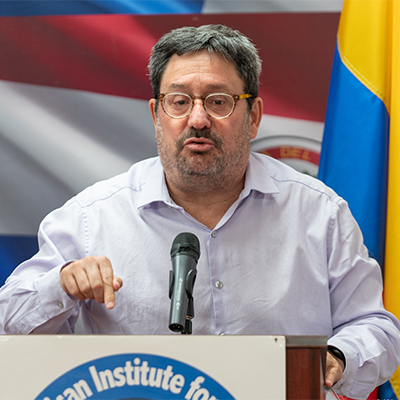Freedom, democracy and pain, two stories

By: Francisco Santos - 09/12/2024
Share:
Freedom is not free and we never appreciate it until we lose it, as happened to me when I was kidnapped or as the Cubans lost it 64 years ago. At the Liberty and Democracy Awards this week we saw, or rather, suffered, the pain of case after case and country after country that see this precious gift disappear or falter. Here are two stories.
When this Cuban, who has been in exile for 64 years, slowly came on stage, he told us with nostalgia how he spent his childhood and youth in a Cuba where there was freedom. Diego Suárez, born into a family of poor peasants in 1926, is an icon of the Cuban diaspora who, at 98 years old, has not lost hope of returning to a Cuba that is finally free. An exciting example of life and perseverance in the fight for freedom, but also a snapshot of what Venezuelans, Nicaraguans and Bolivians will experience if they continue on the path they are on.
At the same event, the two daughters of the murdered Ecuadorian journalist and presidential candidate Fernando Villavicencio spoke. Both wore a t-shirt that asked: “Who ordered the murder of Fernando Villavicencio?” Amanda and Tania’s message is very clear: impunity in this case is the beginning of the end of the weak Ecuadorian democracy, which is now struggling to survive the “correísmo” that, in association with drug traffickers, seeks to end it.
This crime, and what is already known, has one objective: to cover up the direct relationship between Correa and drug traffickers. It is the equivalent of Colombia's 8,000 trial, when drug traffickers financed Ernesto Samper's election to the presidency, but, incredibly, on a much larger scale than in my country, since it is a structural link between the first or second political force in Ecuador and organized crime.
The audio recordings found on the phone of one of the murdered big bosses, Leandro Norero, show how his alliance with the party of former Ecuadorian President Rafael Correa is not tactical, but strategic. The “metastasis” case, as this process is called, also links journalists, judicial authorities and businessmen.
One of them, Xavier Jordan, linked to recordings, lives quietly in the United States despite having an Interpol red notice. His lengthy criminal record seems not to worry the American authorities, something that will hopefully change now with the new Government.
The audacity of this character is unspeakable, or perhaps it is, the fact that he threatens and frightens like the mobster that he is, since he dared to intimidate these victims in Miami, where he lives, when they were going to receive a posthumous award for his father. Of course, he used a cheap lawyer, but the objective is clear. Today, sadly, he and those accused of this relationship with the mafia, and, therefore, with those who murdered Villavicencio, feel at ease, since the current prosecutor has not advanced in the investigations despite the abundant evidence that exists.
It is the responsibility of all of us who love freedom, free journalism and decent politics not to abandon these young women in their fight for truth and justice, and we urge all of us to do everything we can in the United States and in all possible scenarios so that this crime does not go unpunished.
Other cases were presented at the same event, such as that of Bolivian activist Fernando Hamdan, who created the Transparencia Bolivia platform to defend democracy and human rights in his country. He has been under arrest for six months, in preventive detention, “allegedly” for having participated in a coup d’état. One of his complaints: how this mechanism is used to keep citizens imprisoned for up to 15 years.
Listening to a young Cuban priest, Juan Lázaro Vélez, exiled from his country three years ago, or an old Venezuelan activist, Enrique Aristeguieta, last survivor of the Patriotic Junta, which overthrew the dictator Marcos Pérez Jiménez in Venezuela in January 1958, talk about freedom lost in one case or gained and lost again in the other should at least worry us, because no one in our region is safe from that fate.
Colombia is perhaps the country most at risk, but Mexico, Ecuador, Peru, Honduras and Guatemala are also on the same path. We cannot afford to let our guard down. Recovering lost freedom, as Suárez showed us at that event, is almost impossible. Today, the dictatorships of Venezuela and Nicaragua are consolidating and becoming threats to countries where there is still freedom.
I left the event sad, I have to say, because human stories show the fragility of the individual in the face of the power of a repressive State. I was also saddened to hear that exile does not cure and does not heal the desire to return to the land, no matter how many years pass.
Freedom is fragile and today it is more threatened than ever on our continent. We cannot be passive accomplices to what is happening in our region. These stories are an example and a warning.
«The opinions published herein are the sole responsibility of its author».